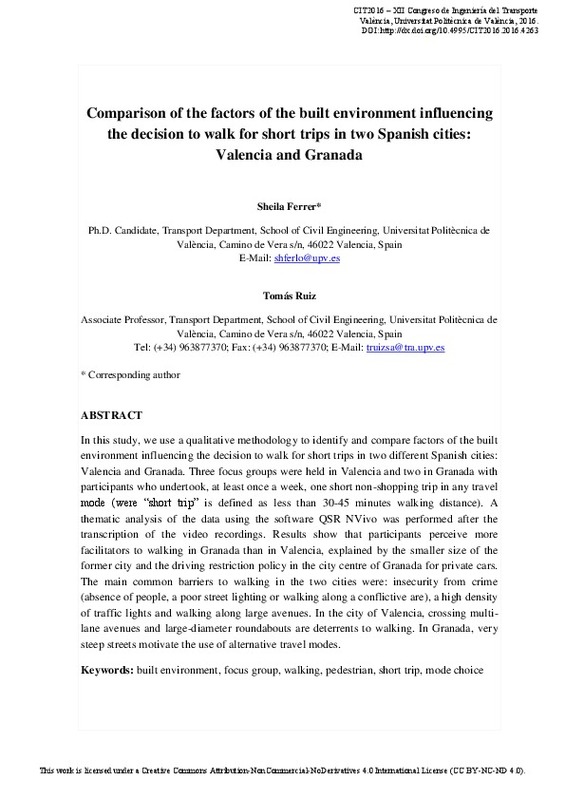Ferrer López, S.; Ruiz Sánchez, T. (2016). Comparison of the factors of the built environment influencing the decision to walk for short trips in two Spanish cities: Valencia and Granada. En XII Congreso de ingeniería del transporte. 7, 8 y 9 de Junio, Valencia (España). Editorial Universitat Politècnica de València. 143-163. https://doi.org/10.4995/CIT2016.2016.4263
Por favor, use este identificador para citar o enlazar este ítem: http://hdl.handle.net/10251/98284
|
Título:
|
Comparison of the factors of the built environment influencing the decision to walk for short trips in two Spanish cities: Valencia and Granada
|
|
Autor:
|
Ferrer López, Sheila
 Ruiz Sánchez, Tomás
Ruiz Sánchez, Tomás
|
|
Entidad UPV:
|
Universitat Politècnica de València. Departamento de Ingeniería e Infraestructura de los Transportes - Departament d'Enginyeria i Infraestructura dels Transports
Universitat Politècnica de València. Escuela Técnica Superior de Ingenieros de Caminos, Canales y Puertos - Escola Tècnica Superior d'Enginyers de Camins, Canals i Ports
Universitat Politècnica de València. Instituto del Transporte y Territorio - Institut del Transport i Territori
|
|
Fecha difusión:
|
|
|
Resumen:
|
[EN] In this study, we use a qualitative methodology to identify and compare factors of the built environment influencing the decision to walk for short trips in two different Spanish cities: Valencia and Granada. Three ...[+]
[EN] In this study, we use a qualitative methodology to identify and compare factors of the built environment influencing the decision to walk for short trips in two different Spanish cities: Valencia and Granada. Three focus groups were held in Valencia and two in Granada with participants who undertook, at least once a week, one short non-shopping trip in any travel mode (were “short trip” is defined as less than 30-45 minutes walking distance). A thematic analysis of the data using the software QSR NVivo was performed after the transcription of the video recordings. Results show that participants perceive more facilitators to walking in Granada than in Valencia, explained by the smaller size of the former city and the driving restriction policy in the city centre of Granada for private cars. The main common barriers to walking in the two cities were: insecurity from crime (absence of people, a poor street lighting or walking along a conflictive are), a high density of traffic lights and walking along large avenues. In the city of Valencia, crossing multilane avenues and large-diameter roundabouts are deterrents to walking. In Granada, very steep streets motivate the use of alternative travel modes.
[-]
|
|
Palabras clave:
|
INGENIERÍA DEL TRANSPORTE
,
Built environment
,
Focus group
,
Walking
,
Pedestrian
,
Short trip
,
Mode choice
|
|
Derechos de uso:
|
Reconocimiento - No comercial - Sin obra derivada (by-nc-nd)
|
|
ISBN:
|
9788460899600
|
|
Fuente:
|
XII Congreso de ingeniería del transporte. 7, 8 y 9 de Junio, Valencia (España).
|
|
DOI:
|
10.4995/CIT2016.2016.4263
|
|
Editorial:
|
Editorial Universitat Politècnica de València
|
|
Versión del editor:
|
http://ocs.editorial.upv.es/index.php/CIT/CIT2016/paper/view/4263
|
|
Título del congreso:
|
CIT2016. Congreso de Ingeniería del Transporte
|
|
Lugar del congreso:
|
Valencia, Spain
|
|
Fecha congreso:
|
June 07-09,2016
|
|
Código del Proyecto:
|
info:eu-repo/grantAgreement/MICINN//TRA2011-27415/ES/METODOLOGIAS DE ENCUESTA DE TRANSPORTE PEATONAL Y ANALISIS DE LA MOVILIDAD A PIE/
|
|
Agradecimientos:
|
We would like to thank the Spanish Ministry of Science and Innovation for funding the
research project PEATON-TRA2011-27415. Furthermore, we would also like to thank the
participants in the study, Pablo García-Garcés for ...[+]
We would like to thank the Spanish Ministry of Science and Innovation for funding the
research project PEATON-TRA2011-27415. Furthermore, we would also like to thank the
participants in the study, Pablo García-Garcés for his assistance with the focus groups,
Rocío de Oña and José Luis Machado for their help to organize the focus groups in
Granada, and Lidón Mars for her help in conducting focus groups.
[-]
|
|
Tipo:
|
Capítulo de libro
Comunicación en congreso
|









